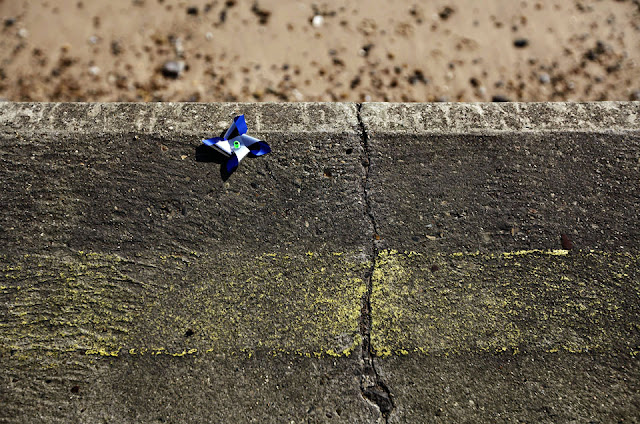Tuesday, 12 June 2012
Diary Picture - 13 November 2010
Disconnected - telephone cables taken down at the point where the security wall divides the Palestinian-administered territory in the West Bank from Israel. At the end of the dead-end road that formerly ran between Bethlehem and Jerusalem.
Monday, 11 June 2012
Friday, 8 June 2012
Diary Picture - 12 April 2008
Walking down the seafront in Clacton I noticed the bright blue sparkle of a child's windmill sitting perilously close to the edge of the promenade.
Twenty minutes later, on my way back, I saw the same twinkle of sapphire, blown onto a different spot on the pavement. Still incongruously blue in a sea of grey and beige. Still vaguely uplifting and tragic at the same time. And still oddly demanding my attention.
Thursday, 7 June 2012
Barry Fantoni
Every so often you get a period in which there seem to be 25 hours in each day and all of them are spent working.
Last week was like that for me. The highlight of this slightly mad schedule was an evening spent doing portrait photographs of the multi-talented british author Barry Fantoni in his french home.
Last week was like that for me. The highlight of this slightly mad schedule was an evening spent doing portrait photographs of the multi-talented british author Barry Fantoni in his french home.
Barry was a leading light in the group of artists, writers, musicians and opinion-makers that made Britain cool in the sixties. It will go down as one of the most exciting and creative periods in our history and many of the things that drove this societal change; arts, music, political satire, were very much his strengths.
It almost goes without saying that lots of people can claim to have been on that particular bus, but Barry was one of the drivers. His role amongst the very first contributors to Private Eye may have been the starting point but from there his influence rapidly spread into television and popular culture.
Despite this, he is perhaps not the household name one might expect. For those not acquainted with his extraordinary back-catalogue, don't bother looking at his ridiculously short entry on Wikipedia. I did, while checking that I had the correct spelling of his name for my captions, and the lack of information is derisory. Barry is evidently too cool for Wikipedia!
The door to his house in Calais was dark and unprepossessing. But on the other side was a home fairly aching with quiet style. Nothing flashy, nothing trendy, nothing unnecessary, just a simple understated taste in eclectic objects and furniture. Emanating from it all was the enveloping and relaxed atmosphere of a life well lived.
I could have spent an entire day and taken pictures from every angle without ever running out of amazing corners and settings for portraits. In fact the biggest challenge was what to do with so much choice in the limited time available. This was exactly the opposite from my morning assignment in a London office where I was left shaking my head in dismay at how hideous all the offered locations were.
Barry disappeared briefly while I decided where to start setting-up. I had asked if he could change the yellow t-shirt he had been wearing because it looked somehow wrong for the kind of author portraits that I had in mind. When he re-appeared minutes later, it was in a shirt that had been made for Picasso. Yes, the Picasso.... Definitely too cool for wikipedia!
Mostly due to the kind of piece I was shooting for, I confined myself to working upstairs in the office/studio he shares with his long-time partner Katie. My favourite pictures from the take were all in the area around this desk. It was a kind of boiled down essence of the creative things he liked to do on a daily basis. Writing, drawing, music, all interspersed with family objects of touching hidden significance.
Often I prefer to shoot horizontal portraits in a wide, slightly environmental way like the one at the bottom -and used by the Independent on Sunday in their interview piece. But it was the more traditional vertical framing with the water stain on the wall behind, that best summed-up the evening's work for me. I made a conscious decision to to frame up with the turntable, desk and painting all leading out of the picture in different directions. The extended intersecting lines of these things, all significant parts of Barry's life, are intended to draw the viewer away from and then and back to his face. And although Barry spent much of the time laughing and joking, I quite liked the slightly contemplative look.
On the wall near his desk were three replica handguns which seemed like the only slightly odd choice or decor in the room. Barry explained that while writing the novels about his creation Harry Lipkin (the world's oldest private detective) he had wanted to get a proper sense of how heavy a handgun would be and how the ageing central character could have realistically carried such a thing.
A we chatted in the course of taking photos, he talked about Depechism, his new art movement and showed me a few examples. As the name suggests, it is all about quick, simple compositions and he disciplines himself to make one every day.
He is the sole member of the Depechist movement at present, but if Barry has decided that's the way to go, you'd be a fool to bet against it being the next big thing.
Subscribe to:
Comments (Atom)






